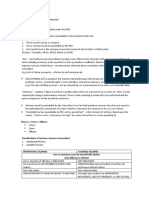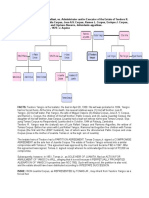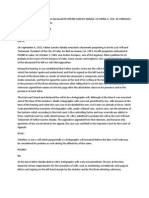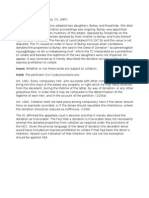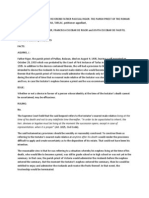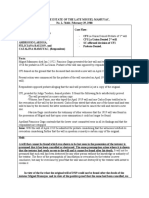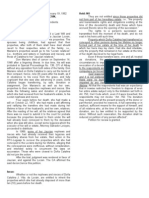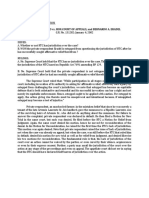REYES V. COURT OF APPEALS (SC L-5620, July 31, 1954)
REYES V. COURT OF APPEALS (SC L-5620, July 31, 1954)
Uploaded by
MhareyCopyright:
Available Formats
REYES V. COURT OF APPEALS (SC L-5620, July 31, 1954)
REYES V. COURT OF APPEALS (SC L-5620, July 31, 1954)
Uploaded by
MhareyOriginal Title
Copyright
Available Formats
Share this document
Did you find this document useful?
Is this content inappropriate?
Copyright:
Available Formats
REYES V. COURT OF APPEALS (SC L-5620, July 31, 1954)
REYES V. COURT OF APPEALS (SC L-5620, July 31, 1954)
Uploaded by
MhareyCopyright:
Available Formats
REYES V.
COURT OF APPEALS [SC L-5620, July 31, 1954]
DOCTRINE:
- If the contract is void, the property still forms part of the inheritance in order not to prejudice the heir.
- The natural children of the deceased in this case are questioning the intrinsic validity of the will on the ground
that his compulsory heir cannot be one, as theirs was an illicit relationship. SC held that as a general rule,
courts in probate proceedings are limited to pass only upon the extrinsic validity of the will sought to be
probated. There are, however, notable circumstances wherein the intrinsic validity was first determined as
when the defect of the will is apparent on its face and the probate of the will may become a useless ceremony
if it is intrinsically invalid. The intrinsic validity of a will may be passed upon because “practical considerations”
demanded it as when there is preterition of heirs or the testamentary provisions are doubtful legality. In this
case however, there was never an open admission of any illicit relationship. Thus, there was no need to go
beyond the face of the will.
FACTS:
Benedicto delos Reyes, during his lifetime, sold some of his properties to the heirs of his executor. The said sale
was challenged by the heirs of the decedent, contending therein that said properties cannot be legally disposed by
the decedent because it forms part of his estate to be inherited by petitioners, the decedent heirs. Both the trial
court upheld the validity of the sale between decedent and the heirs of the executor having said that the sold
properties were sold before the death of the decedent and can no longer be part of the inheritance.
ISSUE:
Whether or not the petitioners are entitled of the property sold by the decedent during his lifetime.
RULING:
NO. In such case, said alienation is void. Here, the sale was declared void for being absolutely simulated and
because of intent to defraud heirs of their legitimes. Hence, said properties still form part of the inheritance of the
deceased.
The general rule is that the heirs cannot validly claim ownership over the properties in question if alienated prior
to the decedent’s death. The rights to succession are transmitted at the moment of death of the decedent (Art.
777 of the Civil Code) Exception is when said alienation is subsequently declared void as when there is intent to
defraud and to deprive the heirs of their legitimes.
Facts: decedent Benedicto de los Reyes, before his death, sold properties to one of the heirs of the executor. The heirs of the former
claimed that the said properties should be part of the inheritance. Trial Court declared the subject properties having been sold before the
death was no longer part of the inheritance.
Issue: whether the properties sold are part of the inheritance? (Void contract)
Held: yes, the properties are part of the inheritance, according to the Civil Code, even these properties sold by the decedent may still be the
object of succession and would be part of the estate and as much, the heirs may still be entitled to the subject properties. Such case may be
considered as a circumvention of the law as the forced heirs may be deprived of their rights to their legitime.
The appealed decision is reversed and the deed of sale was annulled and the parcel of land involved mere declared as pertaining to the
estate of the decedent Benedicto de los Reyes.
(If the contract is void, the property still forms part of the inheritance in order not to prejudice the heir)
You might also like
- APUSH Period 7 TestDocument10 pagesAPUSH Period 7 Testdannyal Alphones100% (1)
- De Borja Vs de BorjaDocument2 pagesDe Borja Vs de BorjaNic Nalpen100% (2)
- Criminal Law Reviewer Notes (Reyes Book 1)Document4 pagesCriminal Law Reviewer Notes (Reyes Book 1)Mharey100% (3)
- In Re Estate of RodriguezDocument4 pagesIn Re Estate of Rodriguezkeith105100% (2)
- Corpus V Corpus (With Table)Document2 pagesCorpus V Corpus (With Table)Pretz VinluanNo ratings yet
- Solano V CaDocument1 pageSolano V CaElah ViktoriaNo ratings yet
- BALONAN v. ABELLANADocument1 pageBALONAN v. ABELLANAMhareyNo ratings yet
- De Borja Vs Vda de de Borja DigestDocument2 pagesDe Borja Vs Vda de de Borja Digestmorningmindset88% (8)
- Vda de Enriquez V AbadiaDocument2 pagesVda de Enriquez V AbadiaPam Ramos100% (1)
- TAN, JR. vs. CA G.R. No. 136368Document2 pagesTAN, JR. vs. CA G.R. No. 136368Mharey100% (4)
- CABRERA vs. NG G.R. No. 201601Document2 pagesCABRERA vs. NG G.R. No. 201601Mharey100% (2)
- BALONAN v. ABELLANADocument1 pageBALONAN v. ABELLANAMhareyNo ratings yet
- 40 - Reyes v. CA S.C. L-5620 July 31, 1954Document2 pages40 - Reyes v. CA S.C. L-5620 July 31, 1954November Lily OpledaNo ratings yet
- BOUGH V. MODESTO (94 Phil, January 28, 1954)Document1 pageBOUGH V. MODESTO (94 Phil, January 28, 1954)MhareyNo ratings yet
- Bautista VS GrinoDocument1 pageBautista VS GrinoMhareyNo ratings yet
- Escuin Vs Escuin FactsDocument12 pagesEscuin Vs Escuin Factsunconquered12No ratings yet
- GUINTO V. MEDINA, 50 O.G. #1 P. 199, October 7, 1953.Document1 pageGUINTO V. MEDINA, 50 O.G. #1 P. 199, October 7, 1953.MhareyNo ratings yet
- Solis v. AscuentaDocument1 pageSolis v. AscuentaJustin Andre SiguanNo ratings yet
- Casiano vs. CADocument1 pageCasiano vs. CAKaren Gina DupraNo ratings yet
- Estate of Amos BellisDocument1 pageEstate of Amos BellisMhareyNo ratings yet
- De Los Santos Vs Dela CruzDocument2 pagesDe Los Santos Vs Dela CruzPB Aly100% (1)
- Corpus v. Admistrator, 85 SCRA 567Document5 pagesCorpus v. Admistrator, 85 SCRA 567Soc SaballaNo ratings yet
- Borromeo-Herrera V Borromeo Case DigestDocument3 pagesBorromeo-Herrera V Borromeo Case Digesthistab0% (1)
- Uson V Del Rosario Case DigestDocument2 pagesUson V Del Rosario Case Digesthistab100% (2)
- Pascual vs. de La Cruz, 28 Scra 421, No. L-24819 May 30, 1969Document2 pagesPascual vs. de La Cruz, 28 Scra 421, No. L-24819 May 30, 1969rodrigo_iii_3No ratings yet
- Borromeo-Herrera v. Borromeo (152 Scra 171)Document3 pagesBorromeo-Herrera v. Borromeo (152 Scra 171)MhareyNo ratings yet
- Bonilla V Barcena Case DigestDocument2 pagesBonilla V Barcena Case Digesthistab100% (4)
- In Re Rev Abadia Case DigestDocument2 pagesIn Re Rev Abadia Case Digesthistab100% (1)
- Estate of Christensen, 61 O.G#46, P. 7302Document2 pagesEstate of Christensen, 61 O.G#46, P. 7302Gabriel HernandezNo ratings yet
- C. Reserva:Reversion Adoptiva CDDocument2 pagesC. Reserva:Reversion Adoptiva CDJeng PionNo ratings yet
- Bough V ModestoDocument1 pageBough V ModestoGenevieve Kristine ManalacNo ratings yet
- Estate of RodriguezDocument1 pageEstate of RodriguezMhareyNo ratings yet
- Cuartico V Cuartico (1955)Document2 pagesCuartico V Cuartico (1955)Jazem Ansama100% (2)
- 05 Estate of RodriguezDocument1 page05 Estate of RodriguezOM MolinsNo ratings yet
- 3 - Aznar v. Duncan DigestDocument1 page3 - Aznar v. Duncan DigestRea Jane B. Malcampo100% (1)
- Florentino V FlorentinoDocument2 pagesFlorentino V FlorentinoGillian CalpitoNo ratings yet
- Parish Priest of Victoria v. Rigor (89 Scra 493)Document1 pageParish Priest of Victoria v. Rigor (89 Scra 493)MhareyNo ratings yet
- De Roma v. CADocument1 pageDe Roma v. CAJane Garcia-Comilang100% (1)
- Victoria V Rigor Case DigestDocument2 pagesVictoria V Rigor Case DigesthistabNo ratings yet
- De Borja v. de Borja, 46 SCRA 577 DigestDocument3 pagesDe Borja v. de Borja, 46 SCRA 577 DigestAbilene Joy Dela CruzNo ratings yet
- Edroso Vs SablanDocument4 pagesEdroso Vs SablanCaitlin KintanarNo ratings yet
- 55 de Roma vs. CA GR No. L-46903Document2 pages55 de Roma vs. CA GR No. L-46903Ma. Micaela Binuya100% (1)
- Suroza V Honrado Case DigestDocument2 pagesSuroza V Honrado Case Digesthistab100% (1)
- De Borja v. Vda. de BorjaDocument1 pageDe Borja v. Vda. de Borjaviva_33100% (1)
- Vicente B. Teotico vs. Ana Del Val, Etc.Document2 pagesVicente B. Teotico vs. Ana Del Val, Etc.Keeno GuevarraNo ratings yet
- Florentino v. Florentino DIGESTDocument3 pagesFlorentino v. Florentino DIGESTkathrynmaydeveza100% (1)
- 4 Gago Vs MamuyacDocument2 pages4 Gago Vs MamuyacJoshua Erik MadriaNo ratings yet
- Agustines Vs CFIDocument1 pageAgustines Vs CFIMhareyNo ratings yet
- Dizon-Rivera Vs DizonDocument2 pagesDizon-Rivera Vs Dizonpja_14100% (1)
- Kilayko V TengcoDocument3 pagesKilayko V TengcoBeeya Echauz100% (2)
- Teotico vs. Del ValDocument2 pagesTeotico vs. Del ValNap GonzalesNo ratings yet
- Leonardo VS CaDocument1 pageLeonardo VS CaJoesil DianneNo ratings yet
- Corpus v. CorpusDocument2 pagesCorpus v. CorpusAngela ConejeroNo ratings yet
- Padura v. BaldovinoDocument3 pagesPadura v. BaldovinoDanica CaballesNo ratings yet
- CAYETANO vs. LEONIDAS (129 SCRA 524)Document1 pageCAYETANO vs. LEONIDAS (129 SCRA 524)MhareyNo ratings yet
- NERA v. RIMANDODocument1 pageNERA v. RIMANDOMhareyNo ratings yet
- Digests Reyes and GuintoDocument4 pagesDigests Reyes and Guintorcciocon08No ratings yet
- Bough v. Modesto, Jan. 28, 1954, 94 Phil.Document1 pageBough v. Modesto, Jan. 28, 1954, 94 Phil.Gabriel HernandezNo ratings yet
- #39 Agtarap Vs AgtarapDocument2 pages#39 Agtarap Vs AgtarapBianca Camille Bodoy Salvador100% (2)
- Belen v. BPI, OlagueraDocument2 pagesBelen v. BPI, OlagueraRJ Nuñez100% (1)
- 23 - Javellana Vs LedesmaDocument1 page23 - Javellana Vs LedesmaJoshua Erik MadriaNo ratings yet
- DIGEST - Locsin V CADocument1 pageDIGEST - Locsin V CAdaphvillegas100% (1)
- Reyes V CADocument1 pageReyes V CATriciaNo ratings yet
- Wills - 1 DigestsDocument7 pagesWills - 1 Digestsclarenceo100% (1)
- Digest Cases For SuccessionDocument23 pagesDigest Cases For SuccessionNadia De Mesa100% (2)
- ASIA UNITED BANK vs. GOODLAND CO. G.R. No. 191388Document2 pagesASIA UNITED BANK vs. GOODLAND CO. G.R. No. 191388MhareyNo ratings yet
- Sps. Gonzaga Vs - Ca, Hon. Quirico G. Defensor, and Lucky Homes, IncDocument1 pageSps. Gonzaga Vs - Ca, Hon. Quirico G. Defensor, and Lucky Homes, IncMhareyNo ratings yet
- Authentication and Proof of Documents (Record Parungo)Document2 pagesAuthentication and Proof of Documents (Record Parungo)MhareyNo ratings yet
- Gabriel L. Duero vs. Hon - Court of Appeals, and Bernardo A. EradelDocument1 pageGabriel L. Duero vs. Hon - Court of Appeals, and Bernardo A. EradelMhareyNo ratings yet
- Alsua-Betts v. CADocument1 pageAlsua-Betts v. CAMharey100% (1)
- Judicial Affidavit Rule Report NotesDocument19 pagesJudicial Affidavit Rule Report NotesMhareyNo ratings yet
- Delos Santos VS Dela CruzDocument1 pageDelos Santos VS Dela CruzMhareyNo ratings yet
- PRESENTATION OF EVIDENCE Note!Document8 pagesPRESENTATION OF EVIDENCE Note!MhareyNo ratings yet
- B0C Gabriel V Perez, GR L - 24075Document2 pagesB0C Gabriel V Perez, GR L - 24075MhareyNo ratings yet
- JUANITA LOPEZ GUILAS Vs CFIDocument1 pageJUANITA LOPEZ GUILAS Vs CFIMhareyNo ratings yet
- Suntay III Vs CojuangcoDocument1 pageSuntay III Vs CojuangcoMhareyNo ratings yet
- B1A Prosource International Inc. v. Horphag Research Management SA GR 180073 J 25 November 2009 JDocument2 pagesB1A Prosource International Inc. v. Horphag Research Management SA GR 180073 J 25 November 2009 JMhareyNo ratings yet
- Agustines Vs CFIDocument1 pageAgustines Vs CFIMhareyNo ratings yet
- Doromal v. CaDocument1 pageDoromal v. CaMhareyNo ratings yet
- B1D Fredco Manufacturing Corporation v. President and Fellows of Harvard CollegeDocument2 pagesB1D Fredco Manufacturing Corporation v. President and Fellows of Harvard CollegeMharey100% (2)
- Suroza v. Judge HonradoDocument1 pageSuroza v. Judge HonradoMhareyNo ratings yet
- Kho V. Ca (Case Digest. G.R. No. 115758)Document4 pagesKho V. Ca (Case Digest. G.R. No. 115758)MhareyNo ratings yet
- Manungas VS LoretoDocument1 pageManungas VS LoretoMhareyNo ratings yet
- GARCIA v. LACUESTADocument1 pageGARCIA v. LACUESTAMhareyNo ratings yet
- B1B - BIRKENSTOCK ORTHOPAEDIE GMBH AND CO. KG (FORMERLY BIRKENSTOCK ORTHOPAEDIE GMBH) vs. PHILIPPINE SHOE EXPO MARKETINGDocument1 pageB1B - BIRKENSTOCK ORTHOPAEDIE GMBH AND CO. KG (FORMERLY BIRKENSTOCK ORTHOPAEDIE GMBH) vs. PHILIPPINE SHOE EXPO MARKETINGMhareyNo ratings yet
- B0E: Diaz v. People of The Philippines and Levi Strauss (Phils.), Inc., GR 180677, 18 February 2013, First Division, Bersamin (J)Document2 pagesB0E: Diaz v. People of The Philippines and Levi Strauss (Phils.), Inc., GR 180677, 18 February 2013, First Division, Bersamin (J)Mharey100% (1)
- B0D - Taiwan Kolin Corporation, Ltd. v. Kolin ElectronicsDocument2 pagesB0D - Taiwan Kolin Corporation, Ltd. v. Kolin ElectronicsMhareyNo ratings yet
- NERA v. RIMANDODocument1 pageNERA v. RIMANDOMhareyNo ratings yet
- B0B Sasot v. PeopleDocument2 pagesB0B Sasot v. PeopleMharey0% (1)
- Taboada V RosalDocument2 pagesTaboada V RosalMharey75% (4)
- EnglishDocument4 pagesEnglishTurcanu AdrianNo ratings yet
- POLITICAL PARTIES INTEGRITY ACT 2014pdfDocument46 pagesPOLITICAL PARTIES INTEGRITY ACT 2014pdfKagyannis SpyrosNo ratings yet
- Norman Doe: Law and Religion in Europe: A Comparative IntroductionDocument282 pagesNorman Doe: Law and Religion in Europe: A Comparative IntroductionEslem Behouri KehilaNo ratings yet
- Cost Waiver (Arvind Vs Mukesh) 16.02.23Document5 pagesCost Waiver (Arvind Vs Mukesh) 16.02.23anshulrsrivNo ratings yet
- In Re Atty. Tranquilino RoveroDocument3 pagesIn Re Atty. Tranquilino Roveroaudreydql5No ratings yet
- International Law - Ian Brownlie: Part I - Preliminary Topics 1. Sources of The LawDocument17 pagesInternational Law - Ian Brownlie: Part I - Preliminary Topics 1. Sources of The LawAmadeus CachiaNo ratings yet
- Sexual Harassment of Women at Workplace: Prof. Shailendra Nigam Shailendra@imi - EduDocument21 pagesSexual Harassment of Women at Workplace: Prof. Shailendra Nigam Shailendra@imi - EduDaksh AnejaNo ratings yet
- DaviesDagbanja - Tort Law GhanaDocument31 pagesDaviesDagbanja - Tort Law GhanaXie DoNo ratings yet
- 2019 02 08 5c5d9fb56c1221549639605Document264 pages2019 02 08 5c5d9fb56c1221549639605Sardar ShamimNo ratings yet
- Mahatma Gandhi and The Nationalist MovementDocument3 pagesMahatma Gandhi and The Nationalist Movementsubhabratapaul23No ratings yet
- Sex and Fuck ofDocument2 pagesSex and Fuck ofSyed Burhan UddinNo ratings yet
- PRIHLASOVACI TISKOPIS CIZINCE (1)Document6 pagesPRIHLASOVACI TISKOPIS CIZINCE (1)Robert DogaruNo ratings yet
- Rayos-Ombac v. Rayos: I - Improper PartyDocument2 pagesRayos-Ombac v. Rayos: I - Improper PartymastergracerngmailcomNo ratings yet
- On Micro ObserverDocument50 pagesOn Micro Observerpradeep kumarNo ratings yet
- Marcos V Robredo PET CaseDocument5 pagesMarcos V Robredo PET Casejovani ema100% (2)
- Reservation CRIME Against HumanityDocument73 pagesReservation CRIME Against Humanitynaagmr59No ratings yet
- Ai, Data Governance and Privacy: Oecd Artificial Intelligence PapersDocument55 pagesAi, Data Governance and Privacy: Oecd Artificial Intelligence PapersAndrea MichinelliNo ratings yet
- Maquera V BorraDocument1 pageMaquera V BorraALEXANDRIA RYLE MUNARNo ratings yet
- GST ProjectDocument18 pagesGST ProjectsukithepcdocNo ratings yet
- 80AC Aliudepur Seva Sahakari Mandli LTD Vs ADIT ITAT RajkotDocument9 pages80AC Aliudepur Seva Sahakari Mandli LTD Vs ADIT ITAT RajkottaxationsocietyNo ratings yet
- Morality of Law - L. FullerDocument22 pagesMorality of Law - L. FullerВесна ЛетоNo ratings yet
- Module III Theories of Political Obligation-DeolontogicalDocument10 pagesModule III Theories of Political Obligation-DeolontogicalSakshi GourNo ratings yet
- Sources of Law in VietnamDocument9 pagesSources of Law in Vietnamtrinhngocbaotran2005No ratings yet
- Ombudsman Complaint - TolentinoDocument5 pagesOmbudsman Complaint - TolentinoReginaldo BucuNo ratings yet
- Executive Order 10 - GFPSDocument1 pageExecutive Order 10 - GFPSAileen Labastida BarcenasNo ratings yet
- 14 CFR Part 39 (Up To Date As of 12-14-2023)Document3 pages14 CFR Part 39 (Up To Date As of 12-14-2023)itsychenNo ratings yet
- 4.1 Judicial Activism in PakistanDocument5 pages4.1 Judicial Activism in PakistanArbaz KhanNo ratings yet
- Administrative Law-Paper5Document3 pagesAdministrative Law-Paper5edenrodgers679No ratings yet
- Perkaba Nomor 4Document90 pagesPerkaba Nomor 4Still Why100% (1)


